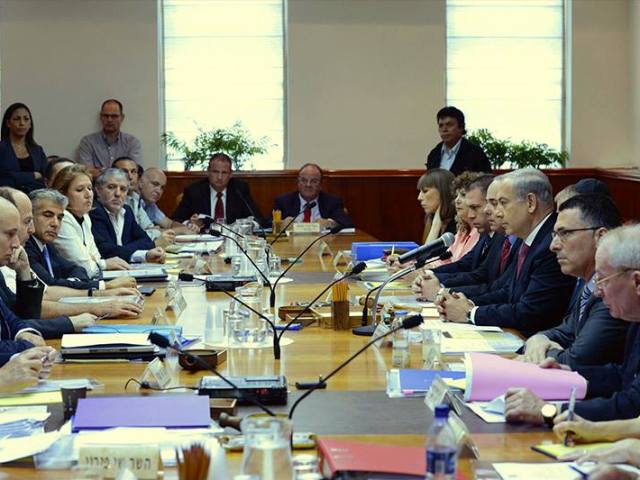Cabinet approves opening of diplomatic negotiations
-
-
7/28/2013
GovXShortDescription
PM Netanyahu: “I believe that resuming the diplomatic process is important for the State of Israel in order to bring about an end to the conflict, and given the security challenges from Syria and Iran.”
-
-

 Israel Cabinet meeting
Copyright: GPO
Israel Cabinet meeting
Copyright: GPO
|
GovXContentSection
(Communicated by the Cabinet Secretariat)
At the weekly Cabinet meeting, today (Sunday, 28 July 2013):
1. Prime Minister Benjamin Netanyahu made the following remarks:
"Today, the Cabinet will discuss three subjects: Resuming the diplomatic process with the Palestinians, the referendum law and authorizing a ministerial committee on the issue of releasing prisoners.
I believe that resuming the diplomatic process at this time is important for the State of Israel both in order to try to bring about an end to the conflict and given the complex reality in our region, especially the security challenges from Syria and Iran.
Any settlement, should one be achieved in the negotiations, will be submitted to a referendum. It is important that every citizen have a direct vote on fateful decisions such as these that will determine the future of the state.
Today, we will authorize a ministerial team to determine the identity of the prisoners that will be released after the opening of the diplomatic process and in keeping with its progress. The team under my leadership will include Defense Minister Moshe Yaalon, Justice Minister Tzipi Livni, Public Security Minister Yitzhak Aharonovitch and Science, Technology and Space Minister – and former ISA Director – Yaakov Peri.
This moment is not easy for me. It is not easy for the ministers. It is not easy especially for the families, the bereaved families, whose heart I understand. But there are moments in which tough decisions must be made for the good of the country and this is one of those moments."
2. The Cabinet appointed a ministerial committee – to be chaired by Prime Minister Netanyahu – on approving development and equipment plans for the security establishment and the intelligence services.
3. Pursuant to Article 23 of the 1959 State Service Law, the Cabinet appointed Ron Dermer as Israeli Ambassador to the US in place of Michael Oren, who is concluding his term.
4. The Cabinet approved the opening of diplomatic negotiations between the State of Israel and the Palestinians in accordance with Prime Minister Netanyahu's statement on the negotiations. The Cabinet also decided to authorize a ministerial team (see above for its members), the work of which will begin after the opening of the negotiations.
The ministerial team will take all measures necessary for the release of 104 prisoners in the framework of the negotiations between Israel and the Palestinians, only after the negotiations will have begun and in accordance with their progress, according to the conditions, criteria, dates and groups to be set by the team, including publicly listing their names.
The State of Israel reserves to itself the right to take all measures against any of the prisoners who will be released should they return to terrorism or violate the terms of their release, in addition to returning them to serve the remainders of their sentences, as will be decided upon by the proper authorities.
Prime Minister Netanyahu thanks US Secretary of State John Kerry for his efforts to bring about the resumption of the diplomatic negotiations between Israel and the Palestinians.
5. Given the urgency that the Government ascribes to advancing the draft Basic Law: Referendum and in accordance with Article 63 of the Government's work bylaws, the Cabinet decided to forego the distribution of a memorandum and today approved the wording of the draft law. As per Article 81 of the Knesset bylaws, the the Cabinet requests that the Knesset House Committee bring forward the discussion of the draft law.
PM Netanyahu: "Any settlement, should one be achieved in the
negotiations, will be submitted to a referendum. It is important that every
citizen have a direct vote on fateful decisions such as these that will
determine the future of the state."
6. The Cabinet decided to adopt the outline on bearing the military and economic burden.
-
-
-
-
-
-
-
-
-
-
-
-
-
-
-
-
-
-
-